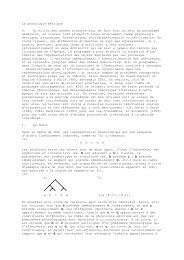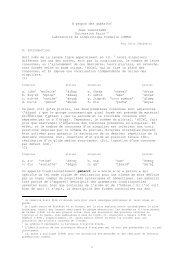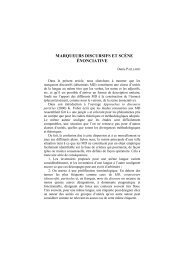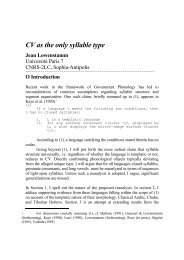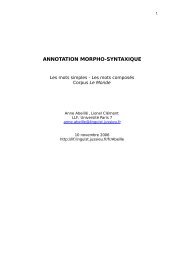DEJA - Laboratoire de Linguistique Formelle
DEJA - Laboratoire de Linguistique Formelle
DEJA - Laboratoire de Linguistique Formelle
You also want an ePaper? Increase the reach of your titles
YUMPU automatically turns print PDFs into web optimized ePapers that Google loves.
Hansen M.B. (2002) From aspectuality to discourse marking : the case of French déjà et encore,<br />
Belgian Journal of Linguistics, 16, 23 – 51.<br />
Muller C. (1975), Remarques syntactico-sémantiques sur certains adverbes <strong>de</strong> temps, Le français<br />
mo<strong>de</strong>rne 43, 1, 12 – 38.<br />
Paillard D. (1992), A propos <strong>de</strong> déjà, L’Information grammaticale, 55, 1992.<br />
Paillard D. (2002), Les mots du discours : i<strong>de</strong>ntité sémantique et principes <strong>de</strong> variation, Cahiers<br />
<strong>de</strong> linguistique <strong>de</strong> l’INALCO 4, 31 – 47.<br />
Paillard D. (2004), Pour une analyse comparative <strong>de</strong>s marqueurs discursifs, Communication à la<br />
conférence Cerlityp (12 – 14 novembre 2004, Paris).<br />
Tahara I. (2004), Adverbe déjà : ses divers usages et son processus interprétatif pragmatique,<br />
résumé, Chronos 6, Genève, septembre 2004.<br />
Van <strong>de</strong>r Auwera J. (1998) Phasal adverbials, in : Van <strong>de</strong>r Auwera (éd.), Adverbial constructions<br />
in the languages of Europe, Mouton <strong>de</strong> Gruyter, Berlin, New York.<br />
Vet C. (1980), Temps, aspects et adverbes <strong>de</strong> temps en français contemporain. Essai <strong>de</strong><br />
sémantique formelle, Droz, Genève.<br />
12



